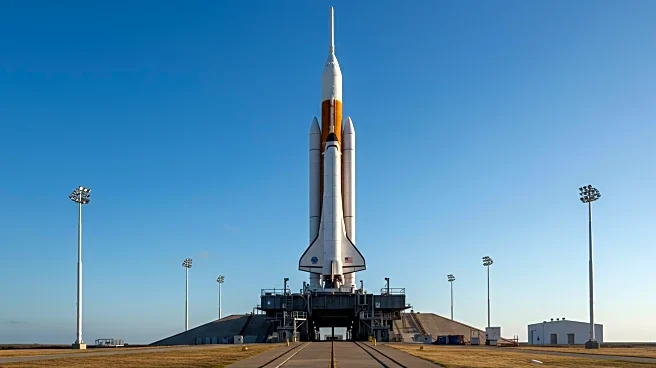What's Happening?
The U.S. government has announced a new policy aimed at enhancing the competitiveness of the American commercial space industry. This initiative seeks to increase the frequency of commercial space launches and novel space activities by 2030. The policy involves streamlining the approval process for commercial licenses and permits for U.S.-based operators. The Secretary of Transportation, in collaboration with the Council on Environmental Quality, is tasked with expediting environmental reviews and removing regulatory barriers to facilitate launch and reentry operations. Additionally, the Secretary of Commerce, along with other federal agencies, will evaluate state compliance with the Coastal Zone Management Act to support spaceport infrastructure development. The policy underscores the importance of maintaining U.S. leadership in space exploration and defense systems, while ensuring national security and economic growth.
Why It's Important?
This policy is significant as it aims to bolster the U.S. position in the global space industry, which is crucial for economic growth and national security. By reducing regulatory hurdles, the government seeks to attract more commercial space activities to the U.S., fostering innovation and technological advancement. The streamlined processes are expected to enhance the efficiency of space operations, potentially leading to increased investment and job creation in the sector. Moreover, the initiative reflects the strategic importance of space exploration capabilities in maintaining U.S. superiority over international competitors. The policy also highlights the government's commitment to supporting the development of next-generation spaceport infrastructure, which is vital for sustaining long-term space exploration and commercial activities.
What's Next?
The Secretary of Transportation is required to report on the actions taken to streamline regulations within 120 days. The Secretary of Commerce, along with other federal agencies, will conduct evaluations and align review processes for spaceport development within 180 days. These steps are expected to lead to the establishment of new categorical exclusions under NEPA for spaceport development projects. The government will also consider applications to the Endangered Species Committee for spaceport projects, ensuring compliance with environmental laws. The Secretary of Commerce will propose a process for mission authorizations under the Outer Space Treaty within 150 days, aiming to expedite approvals for novel space activities.
Beyond the Headlines
The policy raises important ethical and legal considerations regarding the balance between deregulation and environmental protection. The expedited processes may face scrutiny from environmental groups concerned about the potential impacts on ecosystems and biodiversity. Additionally, the focus on national security imperatives in commercial space advancement highlights the geopolitical dimensions of space exploration, as countries vie for dominance in this strategic domain. The initiative may also influence international space policy discussions, as the U.S. sets a precedent for regulatory reform in the commercial space sector.











